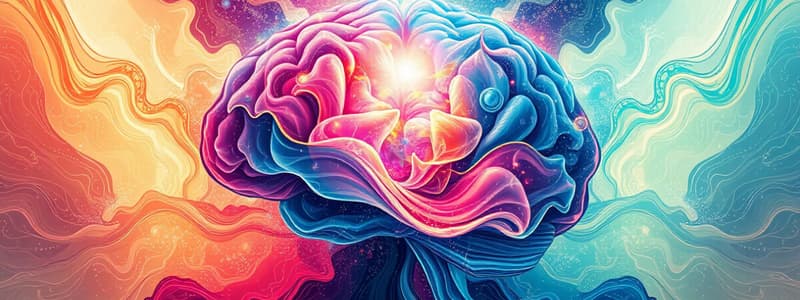Podcast
Questions and Answers
What is intelligence?
What is intelligence?
More than knowing facts and information, it is the ability to learn and use our knowledge to navigate the world successfully.
Who first proposed the concepts of fluid and crystallized intelligence?
Who first proposed the concepts of fluid and crystallized intelligence?
Raymond Cattell
Who further developed the concepts proposed by Raymond Cattell?
Who further developed the concepts proposed by Raymond Cattell?
John Horn
What does the Cattell-Horn Theory suggest about intelligence?
What does the Cattell-Horn Theory suggest about intelligence?
What is fluid intelligence?
What is fluid intelligence?
When does fluid intelligence typically peak?
When does fluid intelligence typically peak?
What is an example of fluid intelligence?
What is an example of fluid intelligence?
What is crystallized intelligence?
What is crystallized intelligence?
When does crystallized intelligence begin to decline?
When does crystallized intelligence begin to decline?
What is an example of crystallized intelligence?
What is an example of crystallized intelligence?
How are fluid and crystallized intelligence interconnected?
How are fluid and crystallized intelligence interconnected?
Flashcards are hidden until you start studying
Study Notes
Intelligence
- Intelligence encompasses the ability to learn, reason, and adapt knowledge to navigate life effectively, beyond mere memorization of facts.
Raymond Cattell
- Introduced fluid and crystallized intelligence concepts in the early 1970s, laying the groundwork for future theories on intelligence.
John Horn
- Expanded upon Cattell's concepts and contributed further development of fluid and crystallized intelligence, emphasizing their interplay.
Cattell-Horn Theory
- Proposes that intelligence consists of various abilities that collaborate to yield overall cognitive performance, influenced by Spearman's g factor concept.
Fluid Intelligence
- Represents the capacity for reasoning, logic, and flexible thinking without reliance on prior knowledge.
- Involves learning new skills, abstract thought, and problem-solving capabilities.
- Peaks around age 20, then gradually declines over time.
Fluid Intelligence Example
- In unfamiliar situations, individuals utilize fluid intelligence to address novel problems, such as painting without prior experience or solving a new puzzle.
Crystallized Intelligence
- Represents the accumulation of knowledge, skills, and experiences gained over a lifetime, including educational background.
- Continues to develop throughout adulthood and begins to decline after age 65, with individual differences in peak levels.
Crystallized Intelligence Example
- Tasks such as taking a vocabulary exam or comprehending a reading passage demonstrate crystallized intelligence, relying on previously acquired knowledge.
Interconnection of Fluid and Crystallized Intelligence
- Both types of intelligence are intertwined; for instance, diagnosing a client requires fluid intelligence for flexible problem-solving and crystallized intelligence for applying knowledge of mental illnesses.
- This combination enhances the effectiveness of treatment planning in psychiatric practice.
Studying That Suits You
Use AI to generate personalized quizzes and flashcards to suit your learning preferences.



